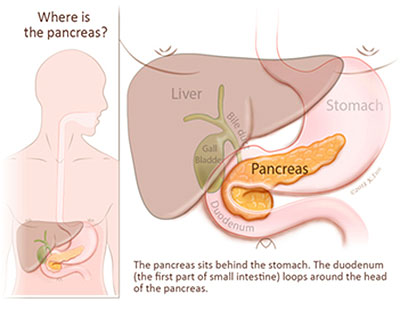The pancreas is shaped like an inverted comma and sits in the upper abdomen, behind the stomach. It has two major functions – the production of enzymes that help in the digestion of proteins, fats and carbohydrates and synthesizing hormones such as insulin which is essential for the control of sugar in the metabolism.
What Is Pancreatitis?
When the pancreas becomes inflamed the condition is known as pancreatitis. In severe cases, it may result in the enzymes the organ produces causing it to digest itself. Pancreatitis appears in two forms – acute pancreatitis and chronic pancreatitis.

The Symptoms
The symptoms of the condition include:
- Pain in the upper part of the abdomen
- Pain that radiates from the abdomen to the back
- Abdominal pain that increases after eating
- Abdominal pain that may be relieved by bending forward or curling the body into a ball like position
- Nausea and/or vomiting
- Indigestion
- Tenderness of the abdomen resulting in pain when it is touched
- Weight loss
The Causes
The common causes of pancreatitis include:
- Changes in lifestyle, including adopting sedentary habits
- Obesity
- Diabetes
- Excessive alcohol consumption
- Smoking
- Drugs
- The presence of gallstones
- Hypertriglyceridemia
- A family history of the condition
- Traumas
- Surgical complications
The Diagnosis
The existence of pancreatitis is typically determined by blood and other laboratory testing. Imaging of the organ by the use of ultrasound, CT and MRI technologies is also used to determine if the condition exists.
The Treatment
The treatment depends on the severity of the condition.
- Acute pancreatitis will normally settle itself in a few days. A hospital stay is usually required as the patient may need strong pain-killing medications and continuous monitoring of the hydration status which may require intravenous infusion. If there are other complications like gallstone pancreatitis, surgery may be required.
- In the case of chronic pancreatitis, the consumption of alcohol must stop, even if it is not the causes of the problem. Smoking must also stop to reduce the risk of pancreatic cancer. Pain-killing medication may be required and enzyme replacement medications may be needed. Fats in the diet must be controlled and vitamin supplements consumed. If diabetes is present, insulin injection may be required. In some cases, surgery may be required.
Prevention
Prevention includes the following lifestyle modifications:
- Stopping the consumption of alcohol
- Stopping smoking
- Control of body weight
- Diet control including avoiding fatty foods
- Regular exercise

Article by Dr. Kannan. D M.S, M.CH(GASTRO), FRCS(GLASG)
Consultant Gastroenterologist
Kauvery Hospital

